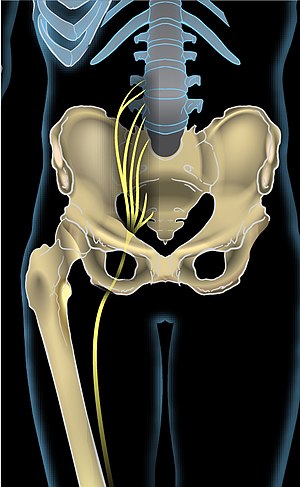Sciatica
| Sciatica | |
|---|---|
| Synonyms | sciatic neuritis, sciatic neuralgia, lumbar radiculopathy |
 |
|
| Anterior view showing the sciatic nerve going down the right leg | |
| Pronunciation | /saɪˈætɪkə/ sy-AT-ik-uh |
| Classification and external resources | |
| Specialty | Orthopedics, neurology |
| ICD-10 | M54.3-M54.4 |
| ICD-9-CM | 724.3 |
| MedlinePlus | 000686 |
| eMedicine | emerg/303 |
| MeSH | D012585 |
Sciatica is a medical condition characterized by pain going down the leg from the lower back. This pain may go down the back, outside, or front of the leg. Typically, symptoms are only on one side of the body. Certain causes, however, may result in pain on both sides. Lower back pain is sometimes but not always present. Weakness or numbness may occur in various parts of the affected leg and foot.
About 90% of the time sciatica is due to a spinal disc herniation pressing on one of the lumbar or sacral nerve roots. Other problems that may result in sciatica include spondylolisthesis, spinal stenosis, piriformis syndrome, pelvic tumors, and compression by a baby's head during pregnancy. The straight-leg-raising test is often helpful in diagnosis. The test is positive if, when the leg is raised while a person is lying on their back, pain shoots below the knee. In most cases medical imaging is not needed. Exceptions to this are when bowel or bladder function is affected, there is significant loss of feeling or weakness, symptoms are long standing, or there is a concern of a tumor or infection. Conditions that may present similarly are diseases of the hip and early herpes zoster before the rash appears.
Treatment initially is typically with pain medications. It is generally recommended that people continue with activities to the best of their abilities. Often all that is required is time: in about 90% of people the problem goes away in less than six weeks. If the pain is severe and lasts for more than six weeks then surgery may be an option. While surgery often speeds pain improvement, long term benefits are unclear. Surgery may be required if complications occur such as bowel or bladder problems. Many treatments, including steroids, gabapentin, acupuncture, heat or ice, and spinal manipulation, have poor evidence for their use.
...
Wikipedia
